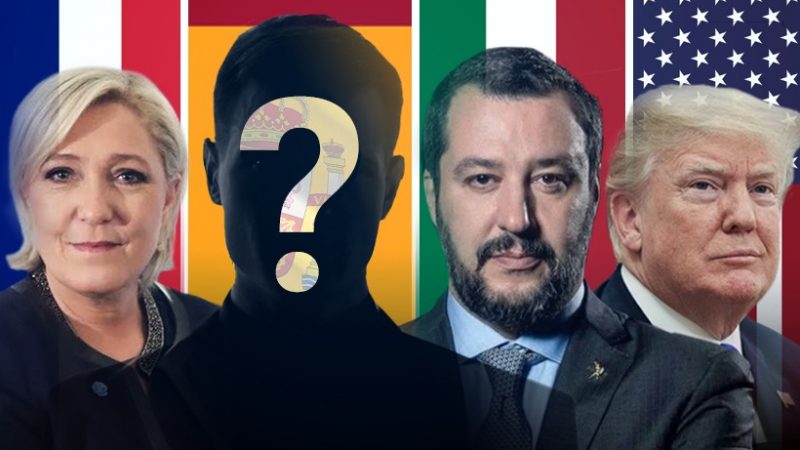The current political situation in Europe and North America, that is, in the “western world”, is marked by the emergence of populist movements. These new political forces question the hegemony of the old parties of the liberal system, who are now threatened with being deposed in elections. In fact, when the parties of the ruling system lost crucial elections in the USA (2016) and Italy (2018), or faced serious rivalry such as in France, Austria, Holland or Germany (2017), they immediately connected their losses with populism or Russia. In regard to Russia, the country has been turned into the ultimate enemy of the West by liberal politicians and the media; and even more intensely so after the electoral victory of Vladimir Putin in March 2018. In this way, populism and Russia are now painted as the greatest threats to the dominant liberal system in the West.
However, in Spain there is no true populist party or movement, neither “right-wing” nor “left-wing”. The party “Podemos”, has been labelled as populist, but in reality it ended up being more like Syriza in Greece: just another political formation exploiting populist rhetoric in the service of the liberal system, and ultimately promoting the same globalist ideology. Among other parties in Spain, the term populism is essentially used as an insult. This brings us back to the question: why has no leader or populist movement emerged in Spain like those we have seen in most other Western countries? In this article, I hope to resolve that question briefly and accurately.
- DEFINING POPULISM
To tackle the question of populism, we must first define it. It is important to limit its very diffuse dimensions to provide a workable conceptual framework. Populism represents a direct appeal to the people, outside of the usual parties, by a leader or group previously alien to mass politics. In using the term “the people” I understand, above all, the part of the population most disadvantaged by the vicissitudes of the liberal political-economic system, that is, the target audience of populist politics are the lower classes, those who suffer the most capitalist economic cycles and austerity policies and cuts in the last decade.
In this sense, the origin of populist leaders lies in the massive delegitimization of the political and economic spheres of traditional political parties, where the perception of inefficiency and inequality is replete. The tension is a result of globalization and multiculturalism being pushed on the population. Furthermore, populist leaders are not necessarily of a specific ideology; that is, they are not necessarily of the right-wing or of the left-wing. In fact, they often lack an easily definable ideology at all, and push instead push unconventional ideas. Therefore, these politicians are difficult to frame, predict and control by the structures of power. However, in each version of populism one always can finds a dichotomy between the Elite and the People, that is, the stateless liberal-capitalist elite and the working people of a given nation (and in certain cases national identity also serves as a vector in defining “the people”). Concepts like right-wing and left-wing are used to simplify relative political positions; the actual positions of the right and left change dramatically over time.
In short, populism opens a new political area led by outsiders with regard to the traditional political parties. Populist leaders eschew conventional ideologies, and appeal to the people in their struggle against the liberal (capitalist) elite who readily forsake the people in critical issues like work, health, housing, and security ( and in certain cases we can add the future of the country and its people). The struggle is then against this capitalist elite that exists at the expense of the people, who must learn to throw off their yoke and advance their own political interests.
- THE CONTEXT OF POPULISM: GLOBAL CRISIS: BETWEEN SOVEREIGNTY AND GLOBALIZATION, BETWEEN IDENTITY AND MULTICULTURALISM
The context in which populism emerges is crucial to understanding its existence and form. We have already hinted at the main contextual apparatus: the crisis of the capitalist system. The last of its cyclical crises began as the financial crisis of 2008 in the US and then spread to the rest of the world. The consequences were severe economic decline and an increase in unemployment, followed by austerity policies and cuts in the European Union which led to greater social unrest (increased by the fact that the liberal elite expects cuts everywhere except in regards to their own personal wealth, which increases the wealth gap more and more). There are other related issues as well, such as the refugee crisis since 2015, in which the European Union began to distribute refugees across various EU countries, while other countries (especially the Visegrad group) have refused to accept the refugees. In emerging populist movements, we find ourselves taking a position of national sovereignty in the face of forced globalization. Sovereign counties are able to set their own internal goals and values, such as developing into a strong nation, capable of governing its own destiny.
Thus, between the years 2008-2018 we increasingly find Western societies in which the welfare state and the liberal concept of a multiculturalism have produced serious crisis. The effects of the financial crisis and the austerity policies promoted by the European Union, as well as the refugee question, represent the basis on which populist movements emerge, composed by leaders who do not want the people to pay for the crisis created by their politicians and governments, whose only offer in return is a horizon of economic depression in decaying societies. The refugee crisis has been a brutal whirlwind in the politics of the European Union. The governments which are attempting to management and distribute migrants (such as France and Germany) are facing off against the categorical opposition of the Visegrad group (and later other countries such as Austria, Croatia and Italy), which do not want to accept refugees without serious control measures, nor the massive immigration promoted by the mainstream media.
Let’s look deeper into these two pressing issues. In regards to the welfare state, we have a social context in which problems of working conditions, unemployment, housing, health, education, and security are leading to serious disagreements to which the traditional politicians offer austerity and any other policies using the rhetoric that such measures will “calm to markets” and “generate stability”. This occurs in both left-wing and right-wing governments. There is a social perception that the old parties, regardless of their supposed ideological orientation, remain unambiguously at the service of the capitalist system. As for the refugee crisis, it serves as a second trigger against the policies of the dominant system, as some countries, mainly in Eastern and Central Europe, refuse to accept refugees and immigrants from Asia and Africa without taking extremely serious precautions. To this we can add the crisis of multiculturalism, since generations of immigrants born and educated in Europe continue to attempt to maintain their identity, refusing to become simply “a citizen of the world”. Most immigrants want to maintain their identity and refuse to become a globalized citizens. Terrorist (jihadist) attacks in Europe are often perpetrated by the sons of immigrants who have a crisis of identity easily exploited by terrorist organizations.
Other European countries are also struggling to maintain their identity against globalist liberalism, and attempt to define themselves as European peoples and Christian: ideas which they do not want replaced by anything or anyone. The context of populism can be framed between economic crisis and a crisis in identity.
However, emerging populisms take on various forms: they do not have the same ideas or intentions since each country has its own unique party system, political culture and concrete problems. For this reason it is important we explore the specific conditions of contemporary Spain. Spain suffers economic and social problems derived from austerity policies and massive immigration encouraged by all of the main political parties, and yet, has not developed a serious populist movement. Why? 3.
3.WHY HASN’T SPAIN DEVELOPED A EUROPEAN STYLE POPULIST MOVEMENT?
First of all, I must point out that the recent history of Spain (20th and 21st centuries) is very different from the rest of Europe, and therefore, the contemporary political context also differs. It will be helpful to summarize our recent history in order to clarify some of the concrete issues at play in Spain today.
3.1. The Second Republic (1931-1939) and civil war (1936-1939):
The current political system has been dominated by left-wing parties who see the civil war as a catastrophe in which they lost their beloved Second Republic at the hands of the right-wing. They capitalize on this history, and as a result take the position of anti-patriotism, anti-militarism, anti-Catholicism and anything else that is related to the Franco’s regime, regardless of whether these things existed prior to Franco, such as the Spanish flag (18th Century), the Eagle of Saint John, or the coat of arms of the Catholic Monarchs (15th Century).
3.2. Francoism (1939-1975) and the transition to democracy (1975-1982):
The legacy of the regime of General Franco, which is now considered to have been a right-wing dictatorship, actually works against the interests of the contemporary patriotic movement, since Franco himself called for a general demobilization after his victory in the Civil War. After the death of Franco (1975), a transition to democracy took place, giving rise to the Constitution of 1978 and the establishment of a parliamentary monarchy. In this new regime, there is no patriotic right-wing largely due to the demobilization during Franco’s regime (with the exception of Fuerza Nueva until 1982) and, moreover, the left-wing has become actively anti-patriotic because they consider patriotism to be synonymous with Francoism. They also advance the ideas that Francoism is synonymous with backwardness, while integration in the EEC represents modernity and the future. Francoism’s ineptitude after victory gave rise to patriotic emptiness, followed by the fragmentation of Falangists parties, Carlists and any newly developed nationalist movements; none of them managed to become a major electoral force, remaining essentially marginal.
3.3. System of Alternating Parties(1982-2011):
Having briefly reviewed the relevant historical context in Spain, let’s now focus on the present. The Spanish party system is based on clientelist parties. The big parties create territorial networks of support based on economic interests: In exchange for a vote in elections, the big parties offer employment through public contracts or in the institutions themselves (they even create new institutions to house supporters).
In addition, the new majority parties, both right and left-wing, favor the creation of a new artificial division: State parties, and nationalist parties (that is, separatists). Even state parties have used nationalist-separatist support when they needed it to form a coalition government. In this context, politics and economic interests are indivisible.
These are important facts to keep in mind, because it is this very system which has prevented the emergence of a party capable of focusing on questions of sovereignty and identity. No relevant political party has had any ideas beyond improving their own economic prospects. There has been no concern at all for Spain as a nation beyond its use as an economic platform. The regime operated by alternating parties until the system became severely corrupt and the economic crisis in 2008 finally made it completely untenable.
3.4. 2011, the system fractures
On May 15th, an apparently popular and spontaneous protest appeared. It was the product of social unrest due to political corruption and inefficiency in crisis management. The protest movement, known popularly as 15-M, brought together thousands of Spaniards, regardless of their ideology, against a common enemy, and in favor of the general good[1]. However,, at the height of 15-M, partisan elements of the left-wing and anarchists appeared who tried to co-opt the protests for their own purposes, which drove away all those who did not share their partisanship. Finally, 15-M vanished into oblivion. Or so it seemed…
In 2014, another fulminating movement appeared, this time with the intention of forming a political force that would really change the country’s political direction. This movement was Podemos. At first, this was a transversal political movement for all political audiences, and for that reason it gained millions of supporters. But, little by little, they began to show their true character as partisan leftist party, until their actual intentions became obvious. It must be pointed that the media gave a lot of support to Podemos. Without media support, the rise of Podemos would have been impossible. Podemos succeeded in electing 5 MEPs in the the European Parliament in 2014, and they positioned themselves as a political force that was going to overcome the old parties (the Popular Party and Socialist Party). At that time they began to talk about the new policy (Podemos), against the old policy (the big parties of the system). In my opinion, the masses are now disillusioned with both 15-M and Podemos. Whereas they started with a message for all audiences, once they were consolidated, they commenced with uniquely leftists messages which didn’t resonate with the general population.
However, in 2015 a new party arrived. It was originally a regional party created in 2006, which had opposed nationalist-separatism in Catalonia, this party was Ciudadanos. Again we see a similar strategy, and massive mainstream media support for the party. Ciudadanos was originally seen as a centrist party, but its actions eventually exposed it as a right-wing liberal party. And thus, we have two new parties which compose the “new policy” in Spain, one on the left and one on the right.
The new policy is: On the left, Podemos, a party of the postmodern left, and on the right, Ciudadanos, a party of the liberal right.
3.5. Crisis from 2015-2016
The general elections in December 2015 opened a period of almost a year (until the new elections in June 2016) in which no government was able to form because no party could obtain the necessary majority. The new parties had broken the strategy of the alternation of parties. In addition, the so-called “separatist challenge” of the Catalan regional government added more political tension. In fact, in the years 2017 and 2018, the separatist tension increased as it never had before, with peaks such as the illegal referendum in October 2017, and other demonstrations in favor of independence as well as demonstrations in favor of the unity of Spain.
At this point it is worth mentioning Russia, although it might seem to have no connection with internal Spanish politics. The mainstream media and numerous politicians from various parties (especially from the Popular Party), started to accuse Russia of supporting separatism in Catalonia, since according to them, Russia wished to weaken and divide the West, by putting into question the democracy of the constitutional regime in Spain. The accusations of supposed Russian interference didn’t finish there, Vladimir Putin was personally accused of being the mastermind and financer of the populist movements in Europe, as well as the triumph of Donald Trump in the US (2016).
3.6. A Lack of Leadership
In addition to all the aforementioned factors that divert people’s attention towards useless political disputes that are created and fostered by the regime’s parties, the last element, and perhaps most important, is the lack of leaders (specifically, of mass leaders). Without leaders there are no ideas, moreover without such leaders, people are unlikely to become politically engaged and develop their own political consciousness. Leaders can transform society, and hence politics and economics. Leaders and their ideas can be sources of both change and stability (depending on the situation). The power of positive leadership is absolutely undeniable.
From the above, an obvious question arises: are there any real mass leaders in Spain? And if not, what is the reason? In my opinion, there are no mass leaders, there are only managers of political parties. These figures popularity is limited, it is uncommon for a political manager to have a rating of more than 5 on a scale of 1 to 10 when surveys are made by the National Institute of Statistics). At the most, we can talk about party leaders, who can mobilize their militants, affiliates and / or voters, but never anything beyond this narrow scope. Only in the early days of Podemos did they manage to mobilize a wide range of people, but when their leftist (and postmodern) orientation became evident, their supporters became limited to those with a similar ideology.
Why have no mass leaders arisen in Spain? There are two main reasons: a strong partisan influence, and a lack of groundbreaking ideas. The partisan influence is evident, as they have the power to raise or topple candidates– political parties even have their own media groups that help promote their campaigns. The lack of groundbreaking ideas is something that has been pointed out since 1922 when the Spanish philosopher José Ortega y Gasset wrote in “La España Invertebrada” (The invertebrate Spain), in which he showed the encapsulation and division of Spanish society into hermetic compartments, and thus, these separate spheres relate only to their supporters or regions, and are unable to discuss ideas for that nation as a whole. Today, the right-wing is liberal and the left-wing is postmodern. No party leader is able to break this mold, and so politics remains compartmentalized and fragmented. The predominant element which characterizes populist movements is their transversality (a model which 15-M and Podemos both initially followed), but if this transversality ceases to exist, then what might have been a populist movement develops into just another subservient party of the ruling capitalist system.
The more general question one might ask is: Why is there no right-wing populism in Spain? In neighboring countries like Italy, there is both left and right populism, the 5 Stars Movement and The League. Again, the situation in Spain is peculiar due to Francoism and the demobilization of the right-wing (1939-1975) as well as the proscription of patriotism in constitutional Spain (1978 onwards), since the majority parties of the right-wing are purely liberal and globalist (such as the Popular Party and Ciudadanos), and don’t promote ideas of Homeland and sovereignty. The right-wing minority parties, up to now, have remained marginal and have no positions in the most important political institutions such as the National Parliament. Real groundbreaking ideas that might help to ferment a populist movement not only lack mainstream media support, the media actively works to discredit and suppress them. Not only must these elements fight against the both arms of the system, they must also struggle with the sectarianism of the left-wing and right-wing, as transversal ideas end up drawing ire from both sides.
4. CONCLUSIONS
The absence of populism in Spain is largely due to a structural situation stemming from the civil war (1936-1939), in which the left-wing, resentful regarding its loss in the civil war, now advances postmodern ideologies (feminism, gender ideology, multiculturalism); and on the other hand there is a right-wing that remains traditionally liberal and globalist, eschewing notions of Homeland and sovereignty. Both the left and right-wing are hermetic compartments that hinder the transversality inherent in populism. They fight over pointless problems which only serve to distract from broader issues. There is a real lack of mass leaders with a perspective capable of overcoming these compartmentalized blockages and advancing a general structural view. For now there are only the germs of populism in the form of marginal parties that have to withstand being attacked from all sides, as their transversality itself is seen as a betrayal.
[1] In fact, 15-M had all the traits of a Color Revolution close to those which occurred in Europe, and especially in countries of the Middle East and North Africa, since 2011 was the year of the “Arab spring”. 15-M chose the strategy of organizing the occupation of central squares with generic slogans in favor of democracy and against the corruption of the parties. The purple color was popularized as the color of 15-M, which would later be adopted as the colour of Podemos.









Leave a Reply